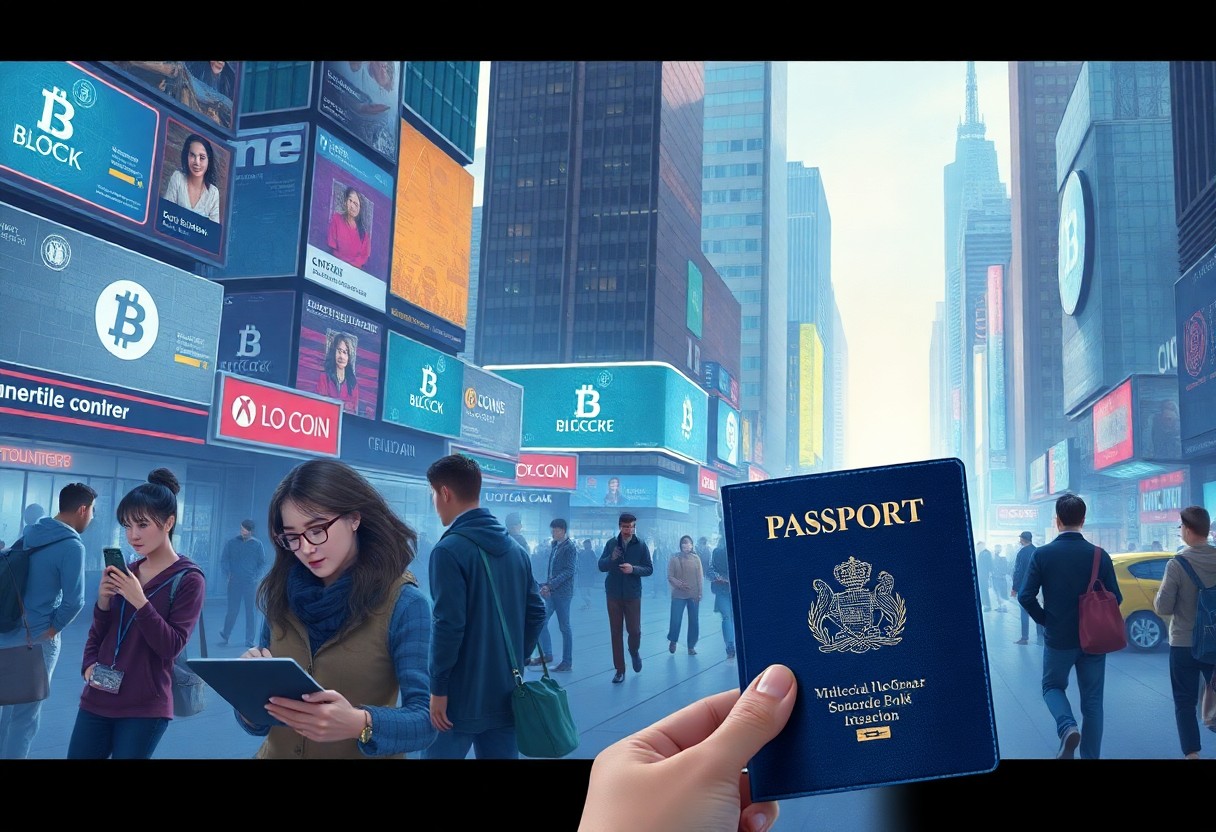Now Reading: The rise of decentralized identity – Can blockchain replace passports?
-
01
The rise of decentralized identity – Can blockchain replace passports?
The rise of decentralized identity – Can blockchain replace passports?

You may have heard about the growing concept of decentralized identity, which uses blockchain technology to provide a secure and user-controlled alternative to traditional identification methods like passports. This innovation not only enhances security by reducing the risk of identity theft, but it also empowers you to manage your personal data more effectively. As governments and organizations explore the potential of blockchain for passports, it’s imperative to understand how this shift could revolutionize the way you prove your identity in a digital world.
Key Takeaways:
- Decentralization: Blockchain technology enables identity verification without a central authority, reducing risks associated with centralized databases.
- Privacy Control: Users can manage their own personal data and share only the necessary information, enhancing privacy compared to traditional passport systems.
- Interoperability: Decentralized identities can work across multiple platforms and borders, potentially simplifying international travel and verification processes.
- Security: Enhanced security features of blockchain technology can lower the risk of identity theft and fraud compared to traditional passport methods.
- Regulatory Challenges: Issues surrounding legal recognition, regulatory frameworks, and standardization remain significant hurdles for widespread adoption of decentralized identity solutions.
Understanding Decentralized Identity
To grasp the concept of decentralized identity, you must know that it provides individuals with a self-sovereign way to manage their identities without reliance on central authorities. You can probe deeper into its potential by checking out Decentralized Identity: The Ultimate Guide 2024. This innovative approach has the ability to redefine how you interact with various services by giving you control over who accesses your personal information.
Definition and Key Concepts
By decentralizing identity, each individual is empowered to own and control their identity attributes without intermediaries. This concept utilizes blockchain technology to ensure that digital identities are secure, verifiable, and resistant to manipulation. You will find that decentralized identities can span various systems, translating into improved privacy and user experience.
Advantages Over Traditional Identity Systems
Behind the traditional identity systems lies a series of challenges that decentralized identity solutions effectively address. This includes issues such as identity theft, misuse of personal data, and the bureaucratic hurdles often encountered when trying to verify identities. With decentralized systems, you can significantly reduce these threats by maintaining control over your information.
Traditional identity systems often struggle with security vulnerabilities, putting your personal information at risk of breaches and fraud. These systems are largely centralized, making them targets for attacks. In contrast, decentralized identity provides you with greater security and privacy as your identity is not stored in a single location. Moreover, you benefit from greater flexibility as you can customize your verification processes. This leads to enhanced user control and minimizes reliance on potentially untrustworthy third parties.
The Role of Blockchain Technology
Even though traditional identity systems face numerous security challenges, SITA plans roll out of decentralized ID passports for travel showcases how blockchain can provide a secure alternative. By leveraging distributed ledger technology, you can ensure that your identity is verified without relying on centralized authorities, making it more resilient against fraud and misuse.
How Blockchain Works for Identity Verification
At its core, blockchain technology enables decentralized identity verification by allowing you to store your personal information securely on a digital ledger. This information is only accessible to authorized parties, ensuring that you maintain control over your data while facilitating seamless verification processes.
Existing Blockchain Solutions
Against the backdrop of increasing demand for secure identity verification, various blockchain solutions have emerged. Some platforms allow you to create self-sovereign identities that enable you to control your personal data, reducing your reliance on traditional ID systems.
But while exploring existing blockchain solutions, you should be aware of both the positive and dangerous aspects. Systems like uPort and Sovrin empower you to manage your identities and personal data independently, enhancing your privacy and security. However, the technology’s potential vulnerabilities, such as technical failures or breaches, highlight the need for comprehensive safeguards to protect your information effectively. Additionally, public acceptance and regulatory frameworks will be important for ensuring a smooth transition to this innovative identity paradigm.
Comparative Analysis: Blockchain vs. Passport Systems
Unlike traditional passport systems, which involve centralized databases managed by government entities, blockchain technology offers a decentralized framework that empowers users with control over their own identity. For a detailed exploration of this transformative concept, check out Discovering the Potential of Decentralized Identity in Blockchain. The following table outlines key differences:
| Control | Centralized (government control) vs. Decentralized (user control) |
| Verification Process | Manual and time-consuming vs. Automated and instant |
| Data Security | Prone to data breaches vs. Enhanced security through cryptography |
Regulatory Challenges and Compliance
With the introduction of decentralized identity, it’s necessary to navigate the regulatory landscape. You may encounter varying legal requirements across jurisdictions, which can complicate compliance efforts. Blockchain’s global nature raises questions about data protection laws and user rights, making it necessary for innovators to align with existing regulations to avoid risks.
Security and Privacy Considerations
Analysis shows that blockchain can improve security and privacy by utilizing advanced cryptography and decentralized storage mechanisms. This reduces the risk of data breaches that often plague traditional passport systems. With your personal information securely stored on the blockchain, only authorized parties can access it, significantly enhancing your privacy.
Plus, the transparency inherent to blockchain can serve as a double-edged sword. While you gain stronger protection against unauthorized access, maintaining anonymity while enabling verification remains a challenge. This balance is vital to protect your sensitive information from potential threats, ensuring that you can confidently participate in a decentralized identity ecosystem.
Use Cases of Decentralized Identity
Now, you may wonder how decentralized identity can transform various sectors. With its ability to provide a tamper-proof and user-centric way to manage personal data, decentralized identity can streamline processes in travel, healthcare, and finance. By granting users control over their information, such systems increase trust and security across digital interactions while reducing fraud and identity theft.
Applications in Travel and Border Control
Decentralized identity has the potential to revolutionize travel and border control by allowing you to securely validate your identity and travel credentials without relying on centralized databases. Using blockchain technology, you can present your verified credentials to border officials through a digital wallet, speeding up the process and enhancing security. This reduces the risk of identity theft while making airport and border experiences more efficient.
Implications for Digital Services and e-Government
Above all, incorporating decentralized identity into digital services and e-government can significantly enhance user experience and data security. By allowing you to manage your own identity, these systems foster trust in public services and reduce your dependence on centralized entities.
eGovernment platforms can benefit immensely from decentralized identity systems. You can maintain ownership of your personal data, eliminating the risk of data breaches commonly associated with centralized systems. Additionally, this approach can lead to enhanced efficiency and cost savings for government operations. By streamlining processes, you stand to gain quicker access to services, such as healthcare and social security, while enjoying better privacy controls. Yet, the shift could pose challenges, including the potential for digital exclusion if users lack the necessary technology or understanding to navigate these systems.
The Future of Identity Management
Keep in mind that the future of identity management is likely to be defined by increased user control, greater privacy, and streamlined verification processes. As decentralized solutions emerge, you may find yourself with more secure and user-friendly options to prove your identity without relying on traditional systems. This transition could profoundly impact how you interact with various services and organizations in an increasingly digital world.
Emerging Trends in Decentralized Solutions
For individuals seeking greater control over their personal information, emerging trends in decentralized identity solutions are promising. You can expect advancements such as self-sovereign identities, which allow you to manage and share your credentials securely. These trends emphasize privacy, user empowerment, and reduced reliance on centralized databases, reshaping the landscape of identity verification.
Potential Barriers to Adoption
Among the challenges facing the widespread adoption of decentralized identity solutions are regulatory hurdles and public skepticism. You may encounter concerns about the security of blockchain technology and the implications of shifting from traditional identity systems. These barriers must be addressed to pave the way for greater trust and acceptance.
Further, some of the most significant barriers to adoption include government regulations, infrastructure readiness, and public awareness. Without a clear regulatory framework, you might feel uncertain about the legality and security of using decentralized identities. Additionally, the necessary technological infrastructure may not yet be in place, leaving you with doubts about the reliability of these systems. Lastly, if you are not aware of the benefits of decentralized identity management, skepticism may arise. Addressing these barriers will be critical for the successful integration of decentralized identity solutions into your everyday life.
Global Perspectives on Decentralized Identity
Many nations are exploring decentralized identity solutions as they recognize the need for secure and efficient identity verification systems. With each country approaching the issue differently, regional approaches highlight diverse needs and solutions while harnessing the potential benefits of blockchain technology to enhance privacy and reduce fraud. The collaboration of governments, private sectors, and non-profits globally showcases an exciting opportunity for individuals to gain greater control over their personal information.
Case Studies from Different Countries
Below, you will find noteworthy case studies illustrating the implementation of decentralized identity systems worldwide:
- Estonia – Implemented e-ID system since 2002, achieving 99% of public services online.
- Canada – Launched the Digital ID and Authentication Council in 2021, seeking to create a standardized framework.
- United States – Piloted ID2020 Alliance in collaboration with various stakeholders to enhance digital identity in marginalized communities.
- India – Introduced Aadhaar, a biometric ID platform with over 1.3 billion enrolled individuals, exemplifying large-scale identity management.
- Sweden – Developed an e-identification framework, allowing citizens access to services with mobile BankID, fostering convenience.
International Standards and Cooperation
Countries around the globe are recognizing that common frameworks in decentralized identity require cooperation and shared standards.
Further, international initiatives like ISO 18013-5 are being developed to create standards for mobile driving licenses and other forms of digital ID that enhance interoperability. While such progress is positive, challenges remain regarding privacy concerns and ensuring data security. The potential for misuse of decentralized technologies necessitates robust discussions and agreements to safeguard users’ best interests as you examine into this evolving landscape.
To wrap up
With this in mind, the rise of decentralized identity through blockchain technology presents a compelling alternative to traditional passports. You can benefit from enhanced security, greater privacy, and seamless verification processes. While blockchain may not completely replace physical passports just yet, its potential to transform how you manage your identity is undeniable. As the technology evolves, staying informed will empower you to take advantage of these innovations, ensuring your identification methods are as secure and efficient as possible in a rapidly changing world.
Q: What is decentralized identity and how does it work?
A: Decentralized identity refers to a system where individuals have full control over their personal information, which is stored and managed on a decentralized network, often powered by blockchain technology. Instead of relying on a central authority, individuals create their own digital identities that can be verified through cryptographic means. This allows users to share their identity information selectively and securely with others, ensuring privacy and reducing the risk of identity theft.
Q: How does blockchain technology contribute to decentralized identity?
A: Blockchain technology plays a key role in decentralized identity by providing a secure, tamper-proof ledger for recording identity-related transactions. This decentralized nature eliminates the need for a central authority, making it difficult for hackers or malicious actors to compromise the identity data. Each interaction with the identity is recorded in an immutable manner, providing transparency and auditability while safeguarding the user’s data, ensuring that individuals maintain control over their personal information.
Q: Can blockchain-based identities fully replace traditional passports?
A: While blockchain-based identities offer several advantages such as enhanced security, privacy, and user control, a complete replacement of traditional passports may face challenges. Governments and border control agencies would need to adopt a standard framework for accepting digital identities. Legal and regulatory issues surrounding the recognition of decentralized identities also need to be addressed. However, it is possible that blockchain identities could complement traditional systems, enabling travelers to carry less physical documentation while ensuring secure verification.
Q: What are the benefits of using decentralized identity over traditional identification methods?
A: The benefits of decentralized identity include enhanced security due to cryptographic protections, greater privacy and control for users, and reduced reliance on centralized authorities that can be vulnerable to data breaches. Users can verify their identities without sharing excessive personal information, limiting the potential for misuse. Additionally, decentralized identities can streamline processes like verification for travel, online services, and access to government services, reducing friction in user experiences.
Q: What challenges does decentralized identity face in terms of adoption?
A: Some significant challenges to adopting decentralized identity include regulatory hurdles, the need for widespread standardized frameworks, and general public awareness and education regarding the benefits of this technology. Moreover, there are concerns over digital literacy and access to technology, which could limit the ability of some individuals to utilize decentralized identity solutions. Additionally, establishing trust in these systems will require collaboration among governments, organizations, and tech providers to create a secure and user-friendly environment.
























